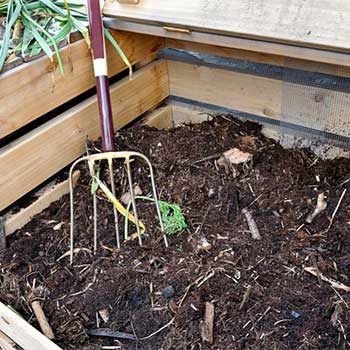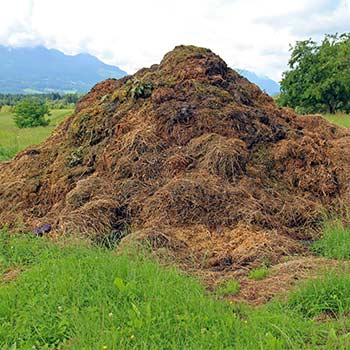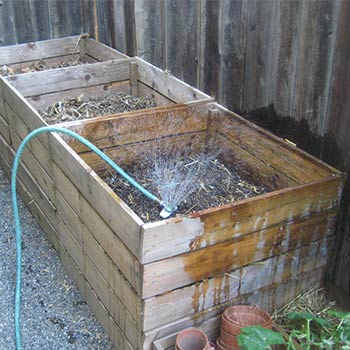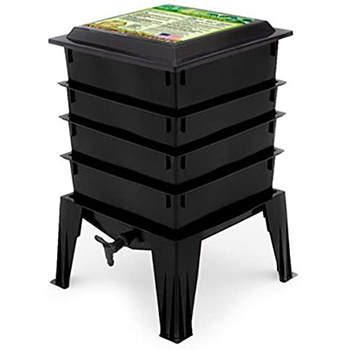
Jobe's Organics Compost Starter

All Seasons Bokashi Compost Starter & Microbial Inoculant

Convino Compost Starter

Biomaster Compost-It Compost Accelerator/Starter

Green Pig 60 Accelerator
If your composting efforts seem to be slower than you expected, then try out a compost starter to speed the process up.

Very few things excite me more in my garden than setting new plants in fresh homemade compost.
I know this makes me sound like a bit of a gardening nerd (or gardenerd as my kids call me).
But there is something very satisfying about knowing that all that organic food waste didn’t end up at a landfill and now will help grow more food and flowers.
One mistake you want to avoid is not giving your compost piles a kick start to speed up the process and give you much higher quality compost.
Let’s start with the basics of compost starters.
What Is A Compost Starter?
A compost starter is an additive that you mix in with the organic matter in your composting bin to jumpstart the natural decomposition process.
While adding some worms along with food and garden waste like leaves will work pretty well, it can be a slow process to get microbes to join the party.
They require a few more things in the compost pile to fully thrive.
But there are other advantages to your composting efforts too.
When you introduce certain elements at the early stages of the process, you can get a lot more nitrogen-rich soil.
I won’t bore you with a chemistry and biology lecture, but keep in mind that the more nitrogen-rich your compost is, the better your plants will grow.
How Do Compost Starters Work?
Compost starters work by adding a mix of minerals, organic material, and beneficial microbes.
These would normally take several weeks and sometimes even months to build up naturally. But adding them in the form of a homemade or store bought compost starter can make sure that you kickstart the process.
Let’s take a closer look.
Introduce Microbes
Kitchen scraps will naturally attract fungi and other microbes, but this can take some time. And even when you see the first signs of mold, it can take a while for it to spread and really take over the food waste.
A compost accelerator will introduce dormant microbes in a significantly large number to speed up that initial process.
Provide Nutrients
Compost boosters also often include nutrients that help bacteria and fungi spread and multiply more quickly. With all conditions being perfect, this extra nutrient rich material can take several weeks off the total time to create compost.
Enrich The Compost
Some of the compost starter products will also contain raw and organic nitrogen. This can make a huge difference when you then use the compost to plant crops and plants in your garden.
The added nitrogen will improve the growing conditions for seedlings and grown plants giving you much better crops and beautiful looking flowers.
Do You Need A Compost Starter?
Technically, your pile will do fine as long as you maintain the right mix of food and garden waste with a healthy colony of worms.
But if you’ve opened up your compost bin after 3 or 4 months and the soil isn’t as advanced as you thought it would be, then the composting process was probably slow and it would help for you to mix a compost starter into the organic material.
Here’s when you need a compost starter.
When Should You Use A Compost Starter?
Here the main reasons to consider using a compost starter:
When Shouldn’t You Use A Compost Starter?
There are some situations where you wouldn’t want to use compost starters:
What Are Good Compost Starters?
There are four things that I always rely on for every fresh compost pile I start.
1. Nitrogen
You need to keep the right balance of green and brown waste in your compost pile because you want to have the right amount of carbon and nitrogen.
But at certain times of the year, it can become more difficult to add enough nitrogen-rich materials like leaves. And that might starve the microbes.
Some organic options are soy or alfalfa meal. But if you can get your hands on a supply of chicken manure to sprinkle into your compost bin, that seems to work best.
2. Oxygen
Both the worms and microorganisms will heavily rely on water and oxygen to thrive.
You can seriously interrupt the composting process by suffocating the pile. This is often the main reason why you might find that the materials you introduce aren’t decomposing.
If you are bin composting, then one thing you can do is regularly rotate the bin to aerate it. But if you have a larger compost pile, then build it up on a base of heavy sticks to allow for easier airflow.
3. Microorganisms
While worms do a lot of the initial heavy lifting, it’s the microbes that break the organic products down into tiny particles.
They will grow naturally as the food waste and leaves start to rot, but you could speed things up a lot when you add more through an activator kit.
Most garden centers will have these available, and I would aim to add them to a few layers to my compost pile to spread out the effects.
4. Shredders
You should get into the habit of chopping up all your waste as small as possible. The smaller the pieces are, the more surface areas there are for microbes to start feasting on.
If you have a large enough compost pile, I would suggest investing in a mechanical shredder, which you can find in any good garden center.
You won’t believe how much this can speed things up.
What Should You Not Use As A Compost Starter?
1. Lime
No, this isn’t the fruit, but an agricultural mineral that farmers use to increase soil pH. Some people add it to their compost pile as the early stages can be quite acidic.
But that acid naturally levels off and plays a vital role in the early stages to kill off certain bacteria and pathogens.
If you’re still concerned about acidity, then I would suggest measuring it along with nitrogen levels at the very end.
If the pH is still below 5, then add some lime before you start planting.
2. Wood Ash
This is a good source of nutrients for your soil, especially if you end up with acidic compost, similar to the above.
But adding wood ash to a compost pile will just see the nutrients wash away as they have nothing to bind to yet.
Again, my advice is to add it just before planting.
Tips To Speed Up Your Compost
Along with the above starters, here are the six things you should always do.
1. Keep Rotating The Compost
This is particularly important in the early stages when the microbes could concentrate in small pockets.
Mixing up the materials will spread out the microbes and deliver some fresh oxygen to your compost as well.

2. Avoid Huge Piles

If you have a large family and garden, your composter can quickly fill up with a lot of organic matter.
However, keeping multiple smaller compost piles of about a 3-foot cube can bring the core temperature up quicker for faster decomposition.
3. Balance Your Greens And Browns
You want to make sure that you don’t just end up with food waste and fresh garden clippings, as this will give you the wrong balance of nitrogen and carbon-rich products.
Make sure you regularly sprinkle dried leaves, sawdust, and even shredded paper to your compost to add more carbon.
4. Don’t Forget To Water The Pile
I tend to sprinkle some water on my pile every few days to keep it moist.
It’s essential not to make it saturated,
So, you need to adjust the amount of water between summer and winter.
As easy as it gets!

5. Use An Insulated Bin Composter

Worms and microbes love some heat, and they will thrive in warm conditions.
But in the colder months of the year, your pile's core can get a bit cooler, which would slow down the process. To prevent that, use an insulated bin composter. The one that I use is the popular Worm Factory 360.
6. Remember Those Worms
Head to your local fishing and tackle store regularly to introduce more worms to your pile.
I myself get mine from Uncle Jim’s Worm Farm.
This might be especially important if you’ve had an unusually cold spell of weather when worms can quickly die.

How Do You Make A DIY Compost Starter?
If you like doing as much as you can with some materials you already have at home, then this is what you need to do.
1. Collect The Materials
Here’s a shortlist of what you’ll need:
Sl.No. | Component | Size/Amount |
|---|---|---|
1 | Sealable Container | 1 Gallon |
2 | Beer | 1 Bottle |
3 | Ammonia | 1/2 Cup |
4 | Non-Diet Soda | 1 Can |
2. Mix It All Up
There’s no real skill involved in this step. Just add the beer, soda, and ammonia products into the container and top it up with water.
You won’t need all of it in one go, which is why I suggest using a sealable container.
3. Sprinkle The Mix
Every few days, you’ll want to add some of this solution, but avoid just dumping it in one place. Use a watering can with a sprinkler head instead.
The idea behind the mix is that the yeast from the beer will digest some brown materials. The ammonia is rich in nitrogen, and the sugar from the soda will help feed the bacteria and grow the colonies.
If that sounds too messy, then let me show you some products I depend on.
Read More:
Things To Consider Before Buying a Compost Accelerator
There are a couple of things you want to think about before choosing a compost accelerator.
Organic Vs Non-Organic
For me, this is the most important question to answer.
If you’re an organic gardener, then you need to carefully look at the ingredients label of a compost starter to make sure there aren’t any synthetic chemicals in there.
These would not break down in the compost, and would impact your organic food.
Size Of The Compost Heap
If you have a large garden you have multiple large heaps going at the same time throughout the year, then you’ll need a bit more than the average size compost starter.
Most products you’ll find will be enough for a small compost bin where you might just get rid of kitchen waste. But once you add in garden waste, that heap can grow a lot and you’ll need a larger pack of an accelerator.
Consider The pH
I personally have two separate rotating compost bins where I aim for a different pH level.
The reason is that I grow different flowers, shrubs, and crops where some of them require more alkaline and others more acidic soil.
For example, my blueberries need to grow in quite acidic solid so in one composter, I add some organic iron sulfur to increase the pH.
If you tend to have plants that require a lower pH, then look for a compost starter that will introduce some lime.
5 Best Compost Starters Available on Market
Here are three products that I regularly rely on for more efficient composting.
1. Jobe's Organics Compost Starter
You’ll also get a good dose of minerals, including nitrogen, to help balance your compost.
There’s also a bonus use for it in early spring. Mixing it directly with soil if you’re replanting some flowers to bigger pots can make it into a slow-releasing fertilizer to boost early season growth.
Oh, and it’s organic!
It might be important for some grow-your-own folks who want to avoid all those chemicals you find in standard fertilizers.
Pros
Cons
Why Do I Like It?
This is a certified organic product that comes in large enough bags to get multiple compost heaps started in an efficient way.
2. All Seasons Bokashi Compost Starter & Microbial Inoculant
It’s a dried product, and I just sprinkle a few scoops of it onto any fresh pile.
The fine bran includes millions of dormant microbes.
Even though they are completely dry in the bag, I’ve found that they activate very quickly, which speeds up the composting a lot.
I also like that there is no smell from the Bokashi compost starter, so you don’t have to store it outside like many other products.
Pros
Cons
Why Do I Like It?
It’s the perfect solution for an indoor compost bin that is ideal if you live in an apartment and want to create smell-free compost.
3. Convino Compost Starter
It contains essential lemon oils and they limit any bad odor rising in your home.
At the same time, there’s no reason why you couldn’t use it for an outdoor composter.
If you have a small backyard, then this could be a great way to make sure you don’t have lingering smells.
Contains a good selection of dormant microbes to give your organic waste a kick start.
Pros
Cons
Why Do I Like It?
Unlike other compost starters, this one contains lemon oil to eliminate bad smells, which makes it ideal for indoor composters.
4. Biomaster Compost-It Compost Accelerator/Starter
Spraying it onto a pile does tend to spread out the micro-organisms better.
The included minerals and microbes also don’t mess with the worms, which is a problem I’ve had with some other accelerators.
If you don’t treat the worms well, then they’ll quickly slow down the progress and possibly die off as well.
And you’ll be able to keep your garden organic, as this accelerator doesn’t use any synthetic chemicals at all.
Pros
Cons
Why Do I Like It?
Sometimes it can be easier to spray a compost starter into a rotating bin to spread out the microbes better.
5. Green Pig 60 Accelerator
Each individual packet mixes easily with two gallons of water that you sprinkle on your compost heap.
It will activate up to nine cubic feet which is great for people with a small to medium size garden.
I also noticed that it seems to contain bad smells more when I tested it in a closed rotating compost bin.
That’s probably due to a great combination of many different microbes.
Pros
Cons
Why Do I Like It?
It comes in pre-measured packets that you just need to drip onto a watering can and then sprinkle over your compost pile.
FAQ
You should turn the compost every four weeks. This involves bringing the materials on the inside to the outside and rotating it. You should also avoid turning it too often as this can disrupt the microbes and fungi that form to break down the organic matter.
You can use compost accelerators when you start a completely fresh heap. The fresh organic matter doesn;t have any microbes or fungi yet, and adding compost starters can significantly speed up those early stages of decomposition.
You can use a mix of water, ammonia and sugary soda for a compost starter. These will act as nutrients for microbes and fungi, and once the decomposition has started, you can add some compost worms as well.
Urine is good for compost because it contains a lot of nitrogen, which is great for organic gardening. However, if you have already added a lot of nitrogen-rich matter like grass clippings, then this might not be a necessary or beneficial step.
Yes, it’s OK to put moldy food in the compost. As long as they are plant-based materials, that mold will help the compost as it’s what starts to break down all the organic matter without use of synthetic chemicals.
Yes, it’s OK to put onions in your compost. If they are cooked, they will break down and decompose very quickly. But make sure that they weren’t exposed to animal fats or meat, as even small amounts could cause problems for the compost.
Yes, banana peels can go in the compost. They are just as suitable as any other vegetable scraps from your kitchen. The peels will actually break down quickly, especially when there’s a bit of heat build-up in the heap.
Compost bins should ideally be in a sunny or partially sun place. The heat from the sun will speed up the development of beneficial microbes. At the same time, too much sun can dry out the heap so make sure you regularly add some water.
Conclusion
Compost accelerators and starters are by no means a must-have, but if you tend to produce quite a bit of compostable waste, then it would make sense to speed up the process.
It’s particularly important to use compost activators if you’re starting a new heap with fresh waste.
It’s relatively easy to use my DIY solution above, but if you want the best possible results, give the Jobe’s compost activator a try. So far, it has never failed me.








I have double barrel turning bins and I live near Atlanta Ga.
I always thought it would be too hot to add worms to my compost?
I am also going to try your DIY starter so thanks!